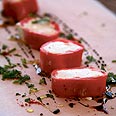
Multicultural team wins culinary championship
Jewish, Muslim, Christian, Armenian chefs from Israel team up to bring home gold medals in culinary world cup, while bringing down political divide with food. 'If we can collaborate in kitchen, why can't leaders?' asks Muslim chef Imad Shourbagi
The team representing Israel in an international cooking championship could not be more diverse: A Jew, a Muslim, a Christian and an Armenian make up the Israeli squad that competed in this year's Expogast Culinary World Cup in Luxemburg.
Armenian Sarkis Yacoubian, Jewish Charlie Fadida, Muslim Imad Shourbagi and Christian Johnny Goric – these four chefs were selected so as not to neglect any sector, and to send audiences a message of coexistence.
They arrived in Luxemburg last week motivated to show chefs from all corners of the world what can be done with a quail and some olive branches. They returned with three gold medals and their share of battle stories.
On November 23, after four years of preparation and several sleepless nights, the chefs could finally allow themselves to breath easy. With the medals in their hands, they took the time to thank the man who so greatly contributed to their victories: Antonio, a cook in a Luxemburg restaurant.
Only a few days earlier they did not know Antonio, but he became their savior during the games. Upon arriving to Luxemburg, they found out that the kitchen promised to them for preparations simply did not exist. "I told myself that nothing will come out of it," Fadida said. "We wanted to pull out of the race."
Local cook saves competition
After wandering around the city searching for a solution, they found Antonio, who was kind enough to allow them make use of the restaurant where he works. They cooked in the kitchen and utilized the basement, as well as the laundry facility of the hotel where the restaurant was located – laundry facility being fancy name for a moldy cluttered room with loose cables hanging from the ceiling, littered with cigarette butts.
"We began looking for pots here, and we found things that haven't been used in years," Fadida said, referring to the so-called laundromat. "You can succeed even in tough conditions."
Assisted by four honor students from the east Jerusalem culinary institute Notre Dame, they cooked to the sound of the washing machines. With the combination of religions and ethnicities, it was not surprising that the Italian Antonio proudly spoke of how nice his new friends were and how glad he was to see them return with medals.
In gratitude, the contestants made the restaurant workers an ethnic meal influenced by their diverse origins, and Johnny Goric gave Antonio a wooden cross – a memento from the holy land.
Goric, who cooks at the InterContinental Hotel in Jericho and is the chef for the Norwegian ambassador to the Palestinian Authority, has made meals for King Abdullah II of Jordan and former French President Jacques Chirac. In 1994, he cooked for then-Foreign Minister Shimon Peres, then-Prime Minister Yitzhak Rabin and then-Palestinian leader Yasser Arafat.
He dreams of opening a restaurant in Israel, while not discarding the possibility of immigrating to Sweden, because he has had enough of politics – a subject the chefs purposefully avoid in the kitchen. "Clearly each one of us has his own feelings," he said. "As chefs working together, we don't pay attention to it."
'If we get along, why can't leaders'
Calm rules these chefs' kitchen; no one pelts frying pans or rubs salt in anyone's wounds. Chef Imad Shourbagi is used to the company of his teammate Fadida, since they work together at the Sheraton Hotel in Tel Aviv. "Charlie and I are like brothers," he says, but admits that he doesn't understand the Israeli leaders, and their difficulty of arriving at an agreement.
"If we are getting along, what is the problem of the ones in leadership?" he asks. "Unfortunately, it's a small minority that makes the decisions. We can't let it take over our lives. To each his own beliefs, that what I teach my children."
Sarkis Yacoubian was the one to initiate the collaboration, which is dubbed "Taste of Peace." He was born in Beirut, and after visiting his grandmother in Jerusalem in 1967, his family was forced to stay when the Six Day War broke out. "The borders were closed and we couldn't leave," he said. "So we stayed and started over. I'm not sorry about it."
Yacoubian said he empathize with the Jewish people, since the Armenian people suffered multiple hardships as well. "For 25 years I have grown among Arabs, and 25 years among Jews. I have friends on both sides. It's not an issue of religion and nationality, it's an issue of being a human being," he said.
'Chefs more powerful than bomb'
Twenty-year-old Moussa was one of the four sous-chefs picked from the Notre Dame school to accompany the team to Luxemburg. Born in Jerusalem's Christian Quarter, he currently lives in the Qalandiya refugee camp.
"We don't have any problems in our kitchen," he said while meticulously ridding a roasted eggplant of its innards. "We cook like brothers, everything together. The chefs are great people, they speak gently and patiently."
The diverse team inevitably drew much interest during the competition, and caught the attention of the World Chefs Association Societies President Gissur Gudmundsson, who came to their corner for some wine and chocolate. The collaboration is a model for chefs all over the world, Gudmundsson said while writing down tips the chefs gave him.
According to Gudmundsson , everything begins and ends in the kitchen; chefs cook for many powerful people, and have the power to kill more people than a bomb. On the other hand, he noted, everyone must eat, so when there's food, there's peace.
- Follow Ynetnews on Facebook










